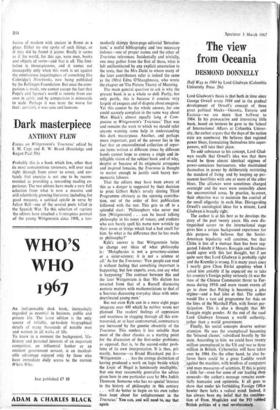The view from Oceania
DESMOND DONNELLY
Half Way to 1984 by Lord Gladwyn (Columbia University Press 29s)
Lord Gladwyn's thesis is that both in time since George Orwell wrote 1984 and in the gradual development of Orwell's concept of three great political blocks—Oceania, Eurasia and Eastasia—we are more than halfway to 1984. In his provocative and interesting little book, based on lectures he gave to the School of International Affairs at Columbia Univer- sity, the author argues that the days of the nation state are numbered. He believes that -regional power blocs, formulating theinselves into super- powers, will take their place.
To add substance to his concept, Lord Glad- wyn recalls that Orwell's idea was that there would be three almost identical regimes of power-conscious bureaucrats, who maintained themselves in power by deliberately restricting the standard of living and by keeping up per- manent hostilities with one or more of the other blocs. The alliances were sometimes changed overnight and the wars were ostensibly about the uncommitted areas. In practice, however, their objective was to maintain the control of the small oligarchy in each bloc. Disregarding Orwell's sociological ideas for a minute, Lord Gladwyn is broadly right.
The author is at his best as he develops the story of the past twenty years. His own dis- tinguished career on the international stage gives him a unique background experience for this purpose. He believes that the Soviet- American bipolarity will continue, but that China is less of a menace than has been sug- gested. I doubt if Messrs. Kosygin and Brezhnev could agree with this last thought, but .1- am quite sure that Lord Gladwyn is probably right and the Kremlin is wrong. It is many years since I nearly gave Chou En-lai apoplexy when I asked him amiably if he expected me to take his country's-foreign policy seriously (it was the time of the Chinese Communist threat to For- mosa during 1954) and more recent events all go to show that Peking is becoming a joke regime—and a bad joke at that. The author would like a vast aid programme for Asia on the lines of the Marshall Plan, with Soviet par- ticipation. This is also a thought that Mr Kosygin might ponder. At the end of the road Lord Gladwyn foresees a world authority, rather than a world government.
Finally, his social concepts deserve serious attention. He sees the unemployed becoming the 'leisured classes,' subsidised heavily by the state. According to him, we could have twenty million unemployed in the US and two to three million in Britain. Cybernetics will have taken over by 1984. On the other hand, he also be- lieves there could be a great Luddite revolt against the machine, with bonfires of computers and mass massacres of scientists. If this is going a little far—even for some of our leading shop stewards—the author's message remains essen- tially humanist and optimistic. It all goes to show that under his forbidding Foreign Office bowler there lurks a radical mind. Indeed, it has always been my belief that the combina- tion of Eton, Magdalen and the FO robbed British politics of a real revolutionary.


































 Previous page
Previous page